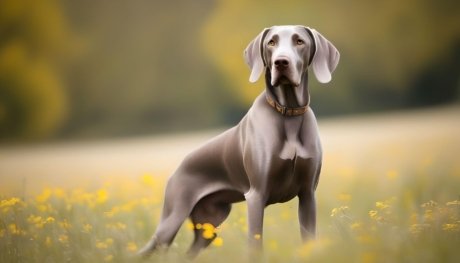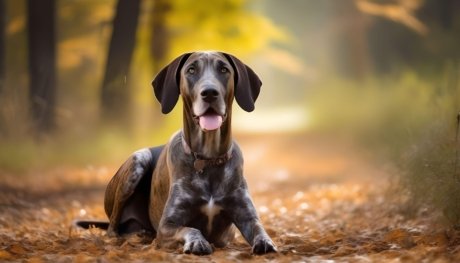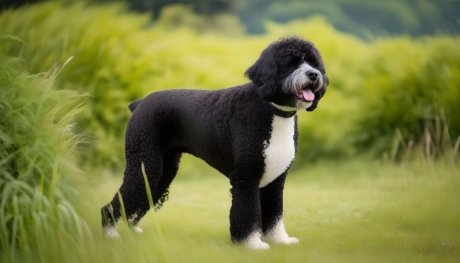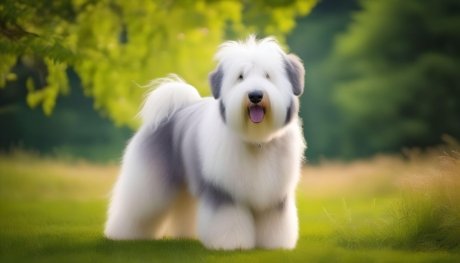Doberman vs German Shepherd | 7 Differences, Prices, Similarities, Care
When it comes to selecting a canine companion, two breeds that frequently catch the interest of dog aficionados are Doberman Pinschers and German Shepherds. These amazing breeds have gained fame owing to their distinct qualities and exceptional talents. In this post, we will compare Dobermans and German Shepherds in depth, discussing their history, physical characteristics, temperament, trainability, activity requirements, health issues, and appropriateness as family pets. So, let’s delve into the intriguing world of Doberman Pinschers and German Shepherds to help you make an informed decision about which breed would be the greatest fit for you and your lifestyle.
Doberman vs German Shepherd:
Here is a comparison and the key differences between Doberman Pinschers and German Shepherds:
| Aspect | Doberman Pinscher | German Shepherd |
|---|---|---|
| Origin | Germany | Germany |
| Size | Medium to large | Large |
| Physical Appearance | Sleek, muscular | Strong, athletic |
| Coat Color | Black, red, blue, fawn | Variety of colors (e.g., black and tan) |
| Temperament | Loyal, protective, energetic | Intelligent, confident, versatile |
| Trainability | Highly intelligent, trainable | Highly intelligent, highly trainable |
| Exercise Needs | High | High |
| Health Concerns | Hip dysplasia, heart issues, hypothyroidism | Hip dysplasia, elbow dysplasia, degenerative myelopathy |
| Living Conditions | Adaptable to various living conditions | Requires space to exercise and play |
| Family Compatibility | Good with proper socialization and training | Good with proper socialization and training |
| Compatibility with Pets | Can coexist with proper socialization | Can coexist with proper socialization |
| Aggression Towards | Wary of strangers, proper socialization needed | Wary of strangers, proper socialization needed |
| Intelligence | Highly intelligent | Highly intelligent |
I. History and Origins:
Doberman Pinscher: The Doberman Pinscher breed may be dated back to the late 1800s in Germany. These dogs were created by a tax collector named Louis Dobermann to be devoted and protective companions. The breed was evolved throughout time by integrating numerous other breeds to improve its characteristics. Dobermans are noted for their vigilance, bravery, and steadfast loyalty today.
German Shepherd: German Shepherds, on the other hand, have a long history reaching back to the late 1800s in Germany. Originally developed as herding dogs, they rapidly acquired popularity for their intelligence, flexibility, and adaptability. German Shepherds have been used in a variety of professions, including search and rescue, police work, and as guiding dogs. Their tremendous work ethic and outstanding abilities have made them one of the most well-known dog breeds in the world.
II. Physical Characteristics:
Doberman Pinscher: Doberman Pinschers have a sleek and muscular shape that emphasises their athleticism and power. They generally stand 24 to 28 inches (61 to 71 cm) tall and weigh 60 to 100 pounds (27 to 45 kg). Their short coat is available in a variety of colours, including black, blue, red, fawn, and Isabella. Notably, their unusual appearance is generally connected with cut ears and docked tails, however, these practises are becoming less popular as trends and rules change.
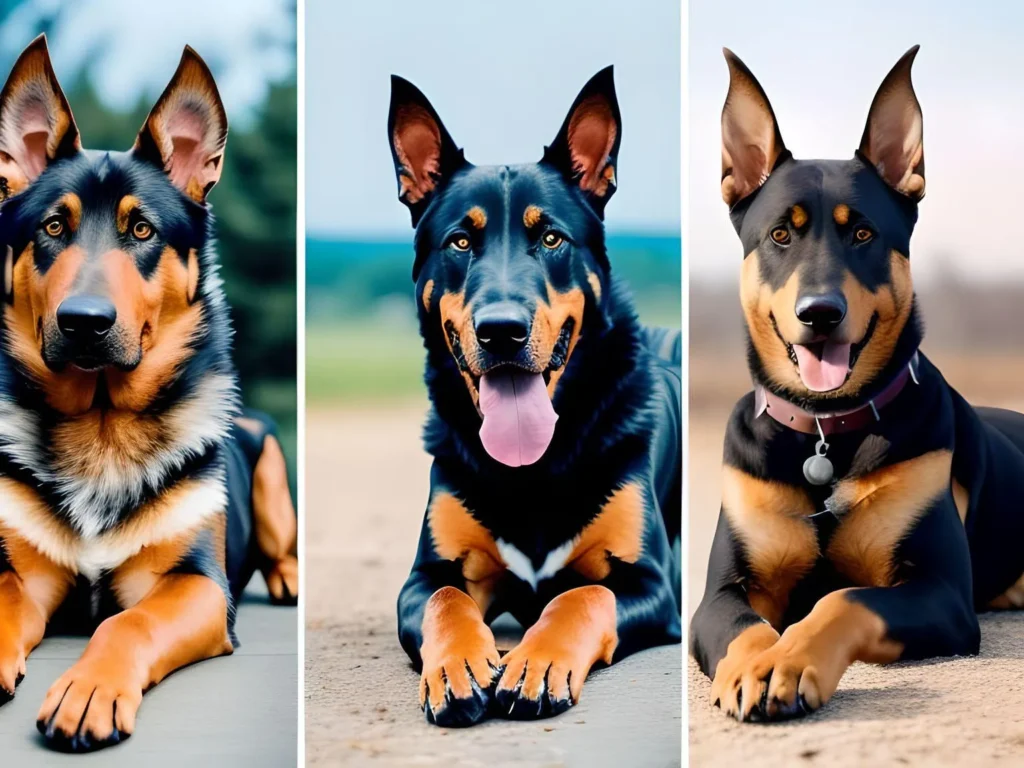
German Shepherd: German Shepherds exhibit a slightly larger and more robust frame compared to Dobermans. Males typically stand at 24 to 26 inches (61 to 66 cm) at the shoulder and weigh between 65 to 90 pounds (29 to 41 kg), while females are slightly smaller. Their double coat consists of a dense outer layer and a thick undercoat, providing insulation and protection from various weather conditions. German Shepherds come in a variety of colours, with the most common being black and tan, but also sable, solid black, and bi-colour.
III. Temperament and Personality Traits:
Doberman Pinscher: Dobermans possess a reputation for their loyalty, protectiveness, and intelligence. They are fiercely devoted to their families and are known to form deep bonds with their human companions. While they are naturally wary of strangers, proper socialization from an early age can help them become well-rounded individuals. Dobermans thrive on mental stimulation and are quick learners, making them suitable for various activities, including obedience training and agility sports. However, their protective instincts require responsible ownership and training to ensure they remain well-behaved and well-adjusted members of society.

German Shepherd: German Shepherds are renowned for their versatility, intelligence, and unwavering loyalty. They are incredibly adaptable and excel in various roles, including as working dogs, service animals, and family pets. German Shepherds are known to be highly trainable, and their innate intelligence allows them to grasp complex commands and tasks quickly. They are also incredibly perceptive and can be excellent at reading human emotions. However, their protective nature can manifest as wariness towards strangers if not properly socialized. Early and ongoing socialization and training are essential to nurture their stable and balanced temperament.
IV. Trainability and Intelligence:
Doberman Pinscher: Doberman Pinschers are highly intelligent dogs that thrive on mental stimulation and challenging tasks. They have a natural inclination to please their owners, which makes them highly trainable. Dobermans are quick learners and have the potential to excel in obedience training, advanced commands, and various dog sports. Consistency, positive reinforcement, and early training are key factors in unlocking their full potential. However, it is important to note that they also require firm and consistent leadership to prevent any dominant tendencies from developing.
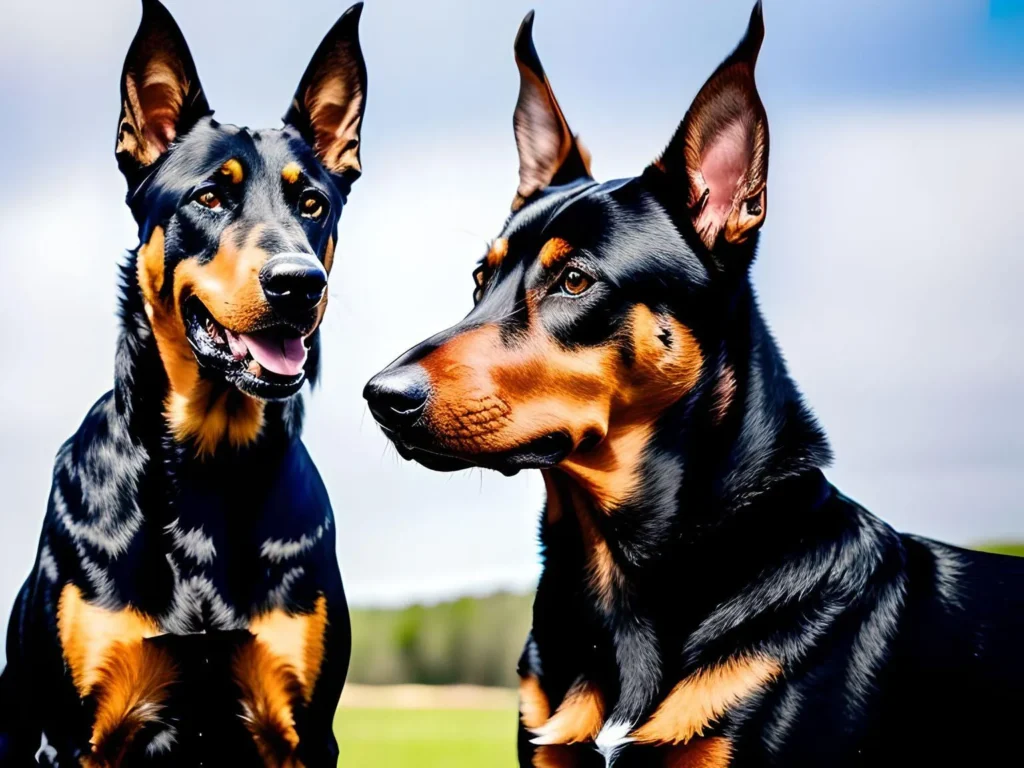
German Shepherd: German Shepherds are recognised for their remarkable trainability and intelligence. They are regarded one of the most intelligent dog breeds and have an instinctive willingness to learn and work. German Shepherds thrive when given a job or purpose, whether it’s obedience training, search and rescue, or even supporting humans with impairments. Their capacity to comprehend and perform difficult tasks makes them a popular choice for a variety of job sectors. Positive reinforcement, consistency, and mental obstacles in training are perfect for unleashing their potential.
V. Exercise and Physical Needs:
Doberman Pinscher: Doberman Pinschers are energetic dogs that require regular exercise to maintain their physical and mental well-being. They have a moderate to high energy level and enjoy activities such as brisk walks, jogging, and play sessions. Engaging them in mentally stimulating exercises, such as obedience training and puzzle toys, can help channel their intelligence and prevent boredom. While Dobermans thrive on physical activities, it is important to ensure they have adequate rest and recovery periods to avoid overexertion.
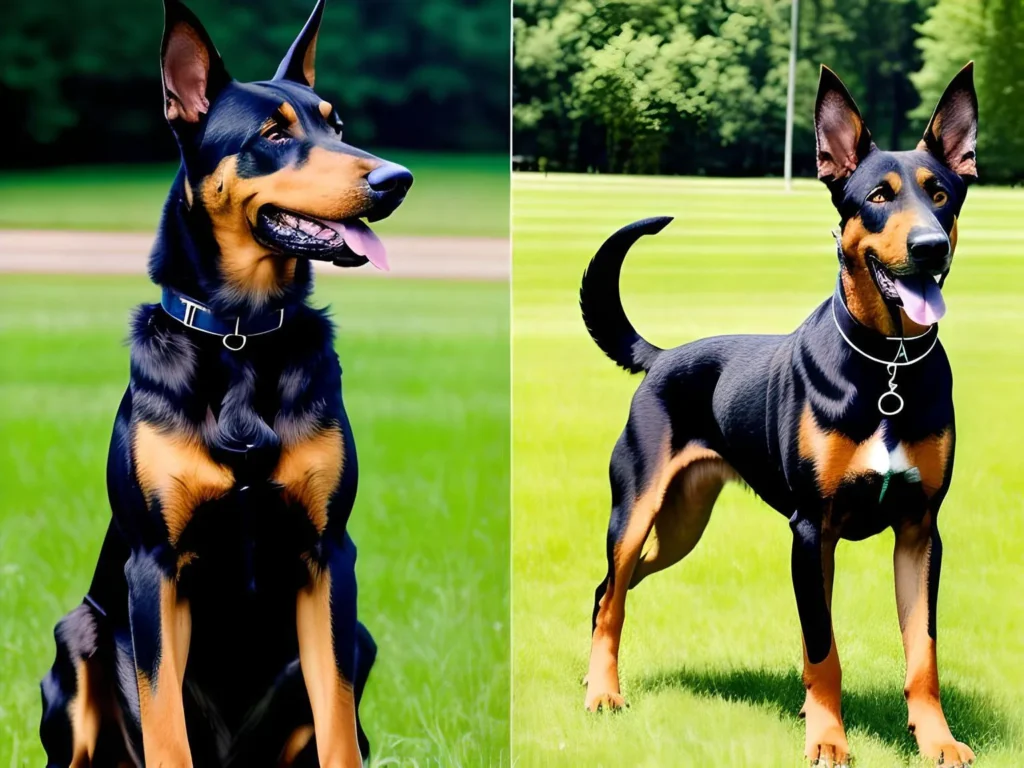
German Shepherd: German Shepherds are known for their high energy levels and require regular exercise to prevent behavioural issues stemming from boredom or pent-up energy. They excel in activities such as long walks, jogging, hiking, and playing fetch. Mental stimulation is equally important, and activities like obedience training, puzzle toys, and interactive games can keep them mentally sharp and engaged. German Shepherds thrive in an environment where they have the opportunity to engage in both physical and mental exercise.
VI. Health and Potential Health Issues:
Doberman Pinscher: Like many purebred dogs, Doberman Pinschers are susceptible to certain health conditions. Some of the common health issues seen in this breed include dilated cardiomyopathy, von Willebrand’s disease, hip dysplasia, hypothyroidism, and progressive retinal atrophy. Responsible breeders conduct health screenings and genetic testing to minimize the risk of these conditions. Regular veterinary care, a balanced diet, and exercise can contribute to the overall health and longevity of Dobermans.
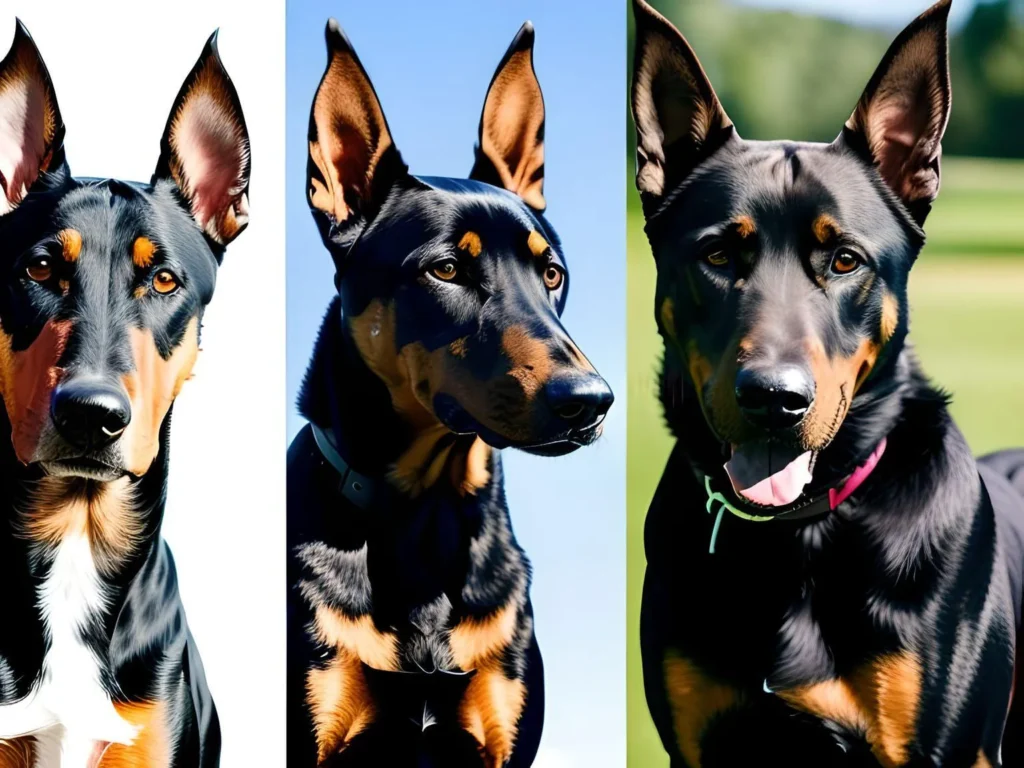
German Shepherd: German Shepherds are generally healthy dogs, but they can be prone to certain health concerns. Hip and elbow dysplasia, degenerative myelopathy, bloat, and allergies are some of the health issues that can affect this breed. Responsible breeders conduct health screenings, including X-rays and genetic tests, to minimize the occurrence of these conditions. Routine veterinary check-ups, a nutritious diet, regular exercise, and maintaining a healthy weight can contribute to the well-being of German Shepherds.
VII. Suitability as Family Pets:
Doberman Pinscher: Doberman Pinschers can make excellent family pets when provided with proper socialization, training, and a loving environment. They are known for their loyalty and protective nature, making them naturally inclined to form strong bonds with their human family. Dobermans are typically good with children when raised together, but supervision and teaching children how to interact with dogs are important. They can also coexist with other pets if introduced properly and given the opportunity to acclimate.
German Shepherd: German Shepherds have a long-standing reputation as loyal and loving family pets. They are known for their gentle and affectionate nature towards their human family members, including children. Early socialization and exposure to different environments play a crucial role in shaping their behaviour around other pets. German Shepherds are highly adaptable and thrive in households where they receive ample attention, exercise, and mental stimulation.
Conclusion:
In conclusion, both Doberman Pinschers and German Shepherds are remarkable dog breeds with their own unique qualities and characteristics. Dobermans impress with their loyalty, protectiveness, and intelligence, while German Shepherds captivate with their versatility, intelligence, and adaptability. When considering these breeds, it is essential to evaluate your lifestyle, the time and effort you can dedicate to training and exercise, and your experience as a dog owner. Regardless of which breed you choose, providing love, care, and a stimulating environment will help foster a strong bond and create a lifelong companionship with your chosen furry friend.
Frequently Asked Questions on Doberman vs German Shepherd:
-
Are Doberman Pinschers good with children?
Yes, Doberman Pinschers can be good with children when properly socialized and raised together. It is important to teach children how to interact with dogs respectfully and supervise their interactions to ensure the safety of both the child and the dog.
-
Are German Shepherds good family pets?
Yes, German Shepherds are known to be excellent family pets. They are loyal, loving, and protective of their human family members. With proper training, socialization, and attention, they can thrive in a family environment.
-
Are Doberman Pinschers aggressive?
Doberman Pinschers have a protective nature, but it doesn’t necessarily mean they are aggressive. Proper training, socialization, and responsible ownership are key to preventing any aggressive behavior. Early socialization and positive reinforcement training can help them become well-adjusted and well-behaved dogs.
-
Are German Shepherds aggressive?
German Shepherds, like any other breed, can exhibit aggressive behaviour if not properly trained or socialized. However, with proper training, socialization, and responsible ownership, German Shepherds can be friendly, well-behaved, and loyal family pets.
-
Do Doberman Pinschers require a lot of exercise?
Yes, Doberman Pinschers are an active breed that requires regular exercise to maintain their physical and mental well-being. They enjoy activities such as brisk walks, jogging, and play sessions. Engaging them in mentally stimulating exercises, such as obedience training and puzzle toys, can also help meet their exercise needs.
-
How much exercise do German Shepherds need?
German Shepherds have high energy levels and require regular exercise to prevent behavioural issues caused by pent-up energy. They benefit from activities like long walks, jogging, hiking, and playing fetch. Mental stimulation through training, puzzle toys, and interactive games is also important to keep them mentally sharp and engaged.
-
What are common health issues in Doberman Pinschers?
Doberman Pinschers are prone to certain health conditions, including dilated cardiomyopathy, von Willebrand’s disease, hip dysplasia, hypothyroidism, and progressive retinal atrophy. Regular veterinary care, a balanced diet, exercise, and early detection through health screenings can help manage and prevent these health issues.
-
What are common health issues in German Shepherds?
German Shepherds can be prone to health concerns such as hip and elbow dysplasia, degenerative myelopathy, bloat, and allergies. Responsible breeding practices, regular veterinary check-ups, a nutritious diet, exercise, and maintaining a healthy weight can contribute to their overall health and well-being.
-
Are Doberman Pinschers easy to train?
Yes, Doberman Pinschers are generally intelligent and eager to please their owners, making them highly trainable. They respond well to positive reinforcement training methods and consistency. Early socialization and obedience training are crucial in shaping their behaviour and ensuring they become well-adjusted dogs.
-
Are German Shepherds easy to train?
Yes, German Shepherds are highly intelligent and known for their trainability. They excel in obedience training and can learn complex tasks quickly. Positive reinforcement training methods, consistency, and mental challenges are ideal for unlocking their potential. Early and ongoing training is important to channel their intelligence and ensure they develop into well-mannered companions.
Suggested Articles related to Doberman vs German Shepherd:
Alaskan Malamute vs Husky | 8 Differences, Similarities, Prices, Care
Long Coat German Shepherd | Price, Breed Profile, Care Tips, Health


























